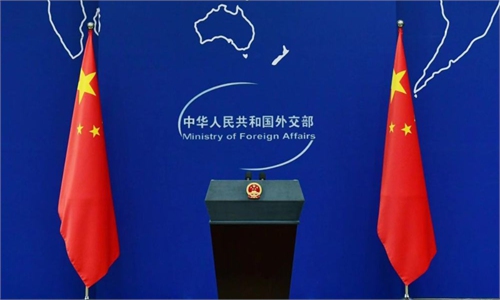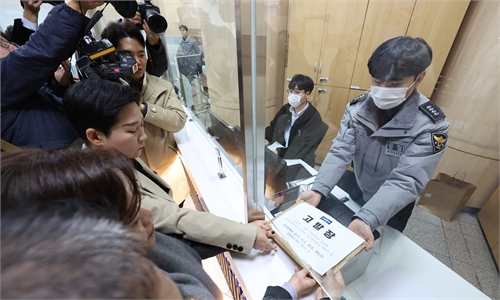
Illustration: Liu Rui/GT
Late Tuesday night, South Korean President Yoon Suk-yeol unexpectedly declared a state of emergency martial law, triggering a political earthquake that shocked the entire country and garnered widespread international attention. While South Korea has implemented martial law multiple times under military governments, this power has largely become a "dormant clause" in the constitution since the nation's transition to civilian-led governance in 1987. However, Yoon's decision to invoke this clause in an attempt to counter political challenges from the opposition party has backfired.South Korea's political landscape has long been characterized by intense party rivalry and fierce factional conflicts. The major political parties are often at irreconcilable odds, particularly the two dominant forces in contemporary politics: the progressive Democratic Party of Korea and the conservative People Power Party. These two parties have fundamental differences in policies and ideologies, frequently engaging in sharp rhetoric and adversarial strategies that exacerbate tensions.
In this political climate, scandals and accusations have become commonplace, with both sides frequently uncovering and exploiting each other's scandals as tools for political attacks or counterattacks. This strategy not only severely damages the political reputations of both parties but also deepens dissatisfaction and divisions among their respective support bases. External factors, such as the situation on the Korean Peninsula, policies toward the US and diplomatic relations with other countries, often become topics - or even instruments - of domestic political contention, further complicating South Korea's internal and external political landscape.
One of the main reasons Yoon cited for declaring a state of emergency martial law was the opposition party's alleged involvement in "anti-state activities plotting rebellion," along with his stated intent to eliminate "anti-state forces" within South Korea. This political environment undermines the continuity and effectiveness of the ruling party's domestic and foreign policies and poses significant challenges to the stability and harmony of South Korean society. The negative effects of severe partisan divisions and escalating factional conflicts have spilled over, leading to societal fragmentation and polarization. Behind the intense political struggles in South Korea, a binary oppositional political logic is particularly evident in both the political and social spheres. People tend to show unwavering loyalty to their preferred party, viewing the opposing side not as competitors for compromise or collaboration but as outright "enemies," leading to pronounced "us" vs "them" divisions on political issues.
After South Korea's National Assembly passed a resolution to lift martial law, Yoon announced he accepted the decision but continued to harshly criticize the opposition party for "budget abuse" and "repeated impeachment attempts." This episode is seen as a vivid reflection of the "us" vs "them" divisions in South Korea.
Of course, amid the political turmoil caused by the "martial law controversy," South Korean politics has not been entirely dominated by partisan struggles and binary oppositional political logic. In the face of the crisis, ruling and opposition parties joined hands to pass a resolution demanding the lifting of the state of emergency martial law. This may hint at the potential for certain changes in South Korea's political landscape in the future.
Currently, the opposition parties in the National Assembly have collectively initiated an impeachment motion against Yoon. Whether the motion will pass, to some extent, depends on whether lawmakers from the ruling party decide to cooperate. If the ruling and opposition parties can come together once again to stabilize the political situation, it could set a precedent for moving beyond intense political struggles. Looking ahead, South Korean politics requires more dialogue, communication, compromise and mutual understanding. Only through these measures can the extreme polarization that defines the current political climate begin to subside.
The author is an associate professor at the School of International Economics and International Relations of Liaoning University. opinion@globaltimes.com.cn


